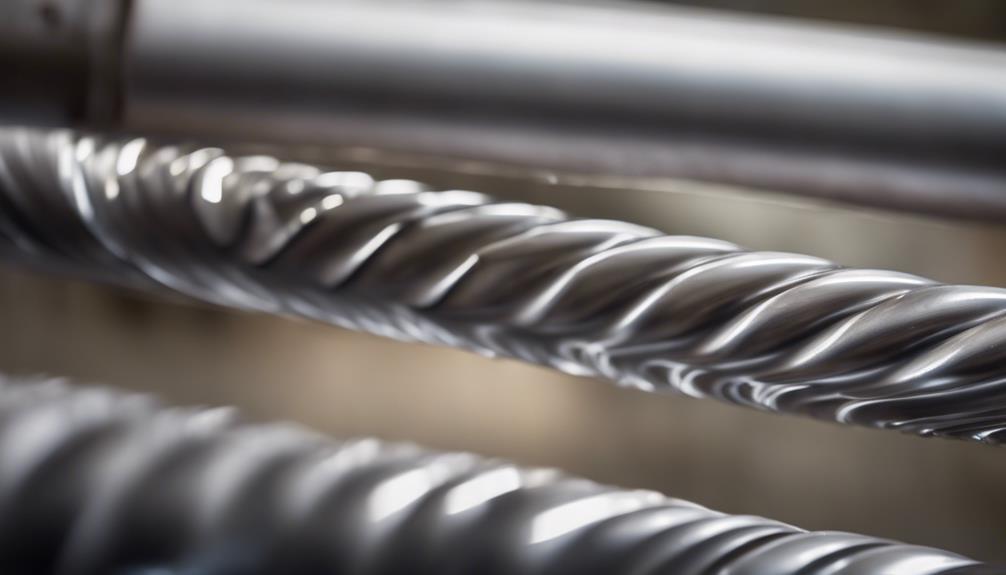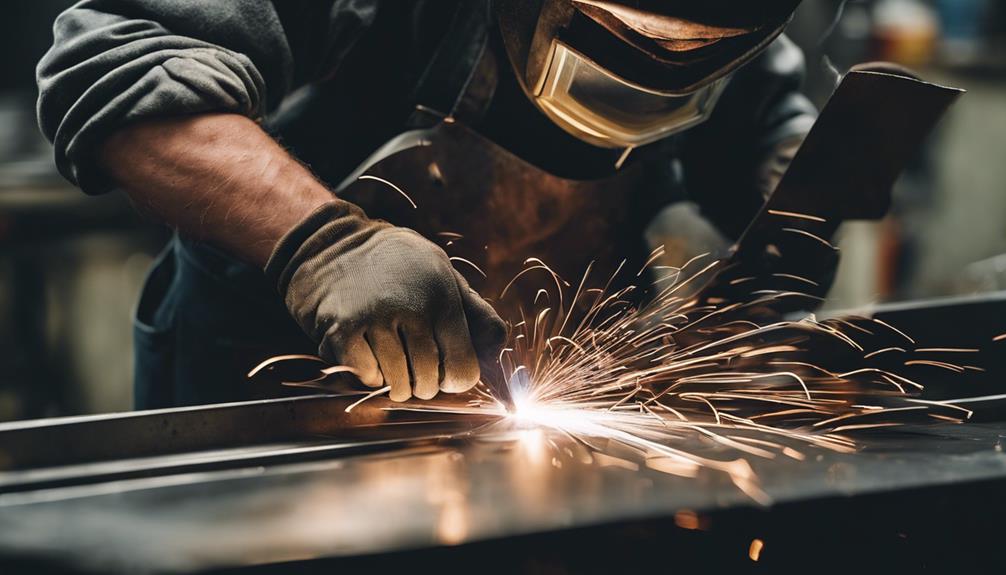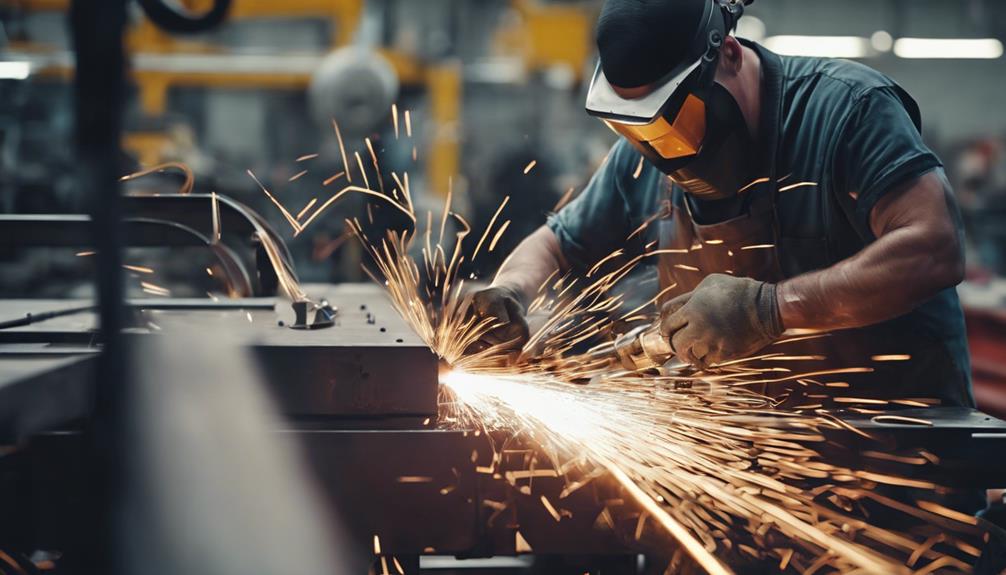Stainless steel excels in industrial steel fabrication due to its unparalleled durability, corrosion resistance, and environmental friendliness. It guarantees structures last longer, resisting corrosion and wear, making it ideal for harsh industrial environments. With over 150 grades available, stainless steel offers customized solutions for specific requirements, promoting efficiency and longevity in projects. The ease of fabrication allows for efficient cutting, bending, and assembly, leading to stringent quality standards in various applications. Discover more about the fire and heat resistance properties that make stainless steel a top choice in industrial settings.
Key Takeaways
- Unparalleled durability for prolonged lifespan of structures and equipment.
- Exceptional corrosion resistance in harsh industrial environments.
- Eco-friendly with high recycled content and recyclability.
- Versatile with over 150 grades tailored to specific requirements.
- Ease of fabrication for efficient cutting, bending, and assembly processes.
Durability of Stainless Steel in Fabrication

Using stainless steel in industrial fabrication guarantees unparalleled durability due to its exceptional resistance to corrosion, wear, and high temperatures. In the domain of industrial steel fabrication, where materials are exposed to harsh conditions and heavy usage, stainless steel emerges as a top contender due to its sturdy nature. Its ability to withstand corrosion from chemicals, moisture, and other environmental factors ensures that structures and equipment built with stainless steel have a prolonged lifespan. Additionally, the high resistance to wear means that components fabricated from stainless steel maintain their integrity even under constant friction or abrasive conditions, making them ideal for industrial settings.
Best Steel Fabrication Company
Another significant advantage of stainless steel in industrial steel fabrication is its capacity to endure high temperatures without compromising its properties. This characteristic makes it a preferred choice for applications where heat resistance is paramount, such as in manufacturing plants or processing facilities. The strength of stainless steel also plays a vital role in ensuring that structures do not bend or crack under pressure, providing a level of reliability that is essential in industrial operations.
Corrosion Resistance in Industrial Applications
With the addition of chromium in its composition, stainless steel exhibits exceptional corrosion resistance, making it a valuable asset in various industrial applications.
The critical layer created by chromium on the surface of stainless steel plays an essential role in protecting against corrosion in challenging industrial environments.
This unique property allows stainless steel to withstand corrosion better than many other materials, ensuring longevity and reliability in industrial settings.
Different grades of stainless steel offer varying levels of corrosion resistance, allowing industries to choose the most suitable option based on their specific needs.
Stainless steel’s ability to resist corrosion makes it an ideal choice for use in harsh and corrosive industrial environments where other materials may deteriorate rapidly.
The durability and longevity of stainless steel in industrial applications are significantly improved by its outstanding corrosion resistance, making it a preferred material for various fabrication needs.
Environmental Sustainability of Stainless Steel

In the domain of industrial fabrication, the environmental sustainability of stainless steel emerges as a pivotal factor influencing decision-making processes. Stainless steel is a standout choice for industrial steel manufacturing due to its eco-friendly properties. With stainless steel being made from 70% recycled material and being 100% recyclable, it notably reduces the need for new mining activities, thereby lessening the environmental impact of manufacturing processes.
This material’s long-term value proposition lies in its sustainability and recyclability, aligning with the principles of a circular economy. Over half of global stainless steel production originates from scrap metal, showcasing the industry’s commitment to sustainable manufacturing practices. Opting for stainless steel in industrial fabrication not only helps in reducing the carbon footprint but also contributes to a more sustainable future by promoting recycling and waste reduction.
Versatility of Stainless Steel Grades
Considering the myriad industrial applications and demands, the versatility of stainless steel grades plays a crucial role in meeting specific requirements with precision and efficiency. With over 150 grades available for various industrial applications, stainless steel offers a wide range of options for constructing industrial steel structures.
Different grades like 304, 316, and 430 provide specific properties such as corrosion resistance, heat resistance, and strength, making them ideal for different industrial fabrication needs. For instance, 304 stainless steel is commonly used in applications where corrosion resistance is paramount, while 316 stainless steel is preferred for its superior corrosion resistance in more challenging environments.
Each stainless steel grade is tailored to meet particular requirements regarding durability, flexibility, and environmental conditions, allowing for customization and optimization in industrial steel fabrication projects. This adaptability guarantees that the material used is precisely suited to the demands of the industrial steel structure, contributing to the overall efficiency and longevity of the project.
Ease of Fabrication with Stainless Steel

Stainless steel stands out as a material that offers exceptional ease of fabrication, making it highly suitable for a wide range of custom projects and manufacturing jobs that demand precision and quality. Industrial steel fabricators find stainless steel easy to work with due to its properties that allow for cutting, bending, and assembly processes to be carried out efficiently.
However, achieving the desired results requires the expertise and modern equipment of professional fabrication companies specializing in stainless steel. Not all industrial steel fabricators have the necessary resources or experience to work with stainless steel effectively, emphasizing the importance of selecting the right steel fabrication company for successful projects.
The ease of fabrication with stainless steel not only streamlines the manufacturing process but also guarantees that the final products meet stringent quality standards, making it a preferred choice for various industrial applications.
Fire and Heat Resistance Properties
An essential aspect of stainless steel in industrial applications lies in its exceptional resistance to fire and heat. High chromium and nickel-alloyed stainless steel grades exhibit excellent fire resistance properties, maintaining structural integrity even at high temperatures. This feature makes stainless steel well-suited for fire prevention applications where materials need to withstand extreme heat conditions.
Industries commonly utilize stainless steel in equipment such as boilers, valves, and heat exchangers due to its outstanding heat resistance capabilities. The heat-resistant alloys present in stainless steel guarantee durability and reliability in environments with elevated temperatures, providing a pivotal advantage for industrial settings where fire and heat resistance are paramount.
Frequently Asked Questions
What’s the Main Advantage of Stainless Steel?
The main advantage of stainless steel lies in its exceptional corrosion resistance, primarily attributed to the presence of chromium. This characteristic enables stainless steel to withstand harsh environments, ensuring long-term durability and minimal maintenance requirements.
Why Stainless Steel Is Used as Construction Material in Industries?
Stainless steel is favored as a construction material in industries for its exceptional durability, corrosion resistance, strength, impact resistance, heat resistance, aesthetic appeal, ease of fabrication, low maintenance requirements, and long-term value, making it a versatile and cost-effective choice for various industrial applications.
Is Stainless Steel Good for Industrial?
Yes, stainless steel is an excellent choice for industrial applications due to its high durability, corrosion resistance, tensile strength, impact resistance, and ability to withstand high temperatures. Its low maintenance needs and longevity also contribute to its suitability in industrial settings.
What Is the Main Advantages of Using Stainless Steel Instead of Mild Steel?
Stainless steel surpasses mild steel in corrosion resistance, strength, durability, heat resistance, and hygiene levels. Its chromium content enhances longevity, reduces maintenance costs, and guarantees compliance with strict cleanliness regulations. These attributes make it a superior choice for various industrial applications.
Conclusion
To sum up, the advantages of using stainless steel for industrial steel fabrication are significant. Its durability, corrosion resistance, environmental sustainability, versatility in grades, ease of fabrication, and fire and heat resistance properties make it a preferred choice in various industrial applications.
Stainless steel’s unique combination of properties makes it a reliable and long-lasting material for a wide range of industrial fabrication needs.

